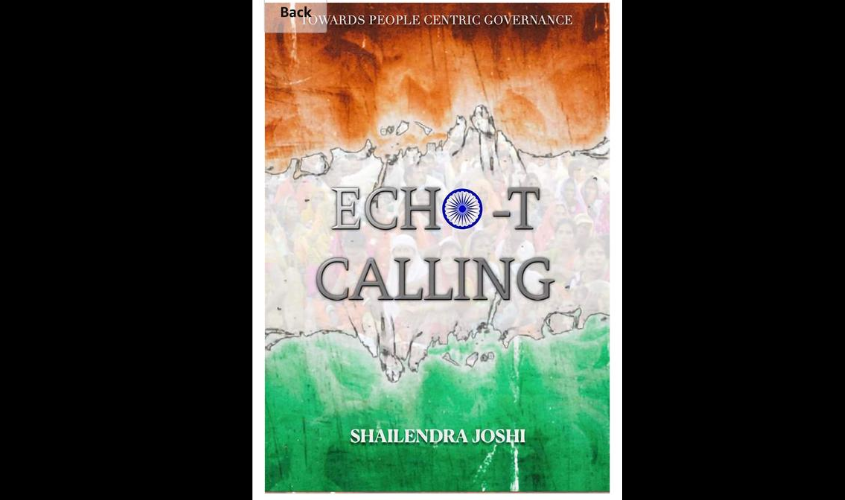The book compels the readers to think about putting the common man from the margins to the centre of the governance equation.
Echo-T Calling: Towards People Centric Governance
Author: Shailendra Joshi
Echo-T Calling: Towards People Centric Governance by Dr Shailendra Joshi is a refreshingly different book in comparison to others on the subject of governance and public administration. It is neither an autobiography self-glorifying the author nor a mere chronicle of facts and figures of various events to set the record straight. This book is basically sharing of experiences and learnings of a bureaucrat with a career spanning almost four decades. The intriguing title and random organisation of chapters enhances the value of the book.
The most endearing aspect of the book is that issues related to public administration has been narrated in a simple, objective and dispassionate manner. It is a unique book; an easy to read piece of literature that covers wide ranging topics on governance and societal issues of our day to day life.
The range of topics covered are remarkable—from “Dilemma of Bureaucracy” to “Swadeshi in Modern Perspective” on the one hand to “Laughter is the Best Medicine” and “the Future Ready Civilization” on the other. It is the unbiased narration that encourages the academically inclined and practitioners of public policy on the one side as well as, all other readers to think about these issues closely and search for possible solutions.
E.S.L. Narasimhan, former Governor of Chhattisgarh, Andhra Pradesh and Telangana, in his foreword has mentioned that the book contains several topics that affect people from every segment of society—all aimed at enhancing the “ease of living” of citizens. Thus, governance is the sum total of the empathy, thinking, and execution of processes by individuals steering various institutions for the betterment of society.
The author is a highly regarded bureaucrat known for his “down to earth” and “people first” approach. The book is largely based on the author’s experiences. Surprisingly, most of his experiences resonate well with the common man.
The author subscribes to the premise that the people are the real masters in a democracy. Both elected and selected representatives are meant to serve and should be accountable to the people.
The author in an innovative manner develops an administrative model based on individuals, institutions and processes which grow on and impact each other. According to him, administration in India is still largely based on the colonial legacy of distrusting citizens. In order to achieve su-rajya (good governance), a change of this mindset is a must.
This book compels the readers to think putting the common man from the margins to the centre of the governance equation. This task is easier said than done. This is, indeed, a daunting challenge but doable with the right priorities. The enhanced awareness among the masses is expected to help in identifying the root cause of problems and their likely solutions. Although a wide range of topics are covered, but not exhaustively. The book will be of interest to the readers having stakes in the present and future India. Similarly, academicians, the younger lot planning to be prospective administrators and all genres of practising administrators must read this book.
Rajiv Kumar, IAS (Retd), is currently Election Commissioner, ECI, and a Former Finance Secretary cum Secretary Department of Financial Services.
Still waters run deep. I have known Dr S.K. Joshi for the last 36 years as a passionate listener and silent absorber of situations around him. An engineer’s mind, of course, is always processing for optimal solutions. Reaching heights to listen to echoes of the signals of his book was a well-deserved culmination of the career of Dr SKJ. And so is the book reflecting an insider’s distilled view on a wide range and intricate aspects of policy choices across the complex web of diversity in the society and optimal allocation of resources thereto. Dr SKJ’s style is unique and unconventional in covering a wide range of governance challenges in an ever-changing equilibrium of ideologies, priorities, styles and powers in representative democracy. The citizen-centric approach dealt with a lot of practical wisdom to bring ease of living is very relevant from aspirational Indian society’s perspective. The insight into policy making will certainly add to the body of literature and help practitioners in realising the unique demographic advantage of India. An enjoyable read.
Rajiv Kumar, IAS (Retd), is the Election Commissioner. He is former Finance Secretary cum Secretary Department of Financial Services.

